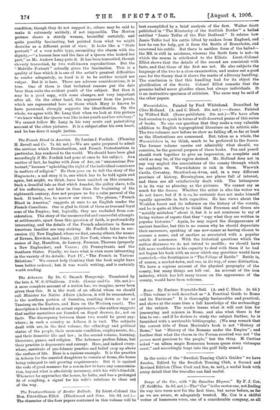The French Blood in America. By Lucian J. Fordick. (Fleming
H. Revell and Co. 7s. 6d. net.)—We are quite prepared to admit the services which Protestantism, and French Protestantism in particular, has rendered to the world. We should have been glad accordingly if Mr. Fordick bad gone at once to his subject:. As a matter of fact, he begins with Joan of Arc, an 'unconscious Pro- testant," because "upholding the right of the individual conscience in matters of religion." He then goes on to tell the story of the Huguenots ; a sad story it is, one which has to be told again and again, bat might, we think, have been omitted on this occasion. Such a dreadful tale as that which Amadee, the galley slave, tells of his sufferings, not later in time than the beginning of the eighteenth century, does not prepare us for a calm perusal of the book. It tends, too, to narrow our views. The phrase, "French Blood in America," suggests at once to an English reader the French Canadians. One is glad to think of them as true and loyal sons of the Empire; but, logically, they are excluded from con- sideration. The story of the unsuccessful and successful attempts at settlements, apart from this question of faith, is profoundedly interesting, and the details of the French admixture in famous American families are very striking. Mr. Fordick takes in suc- cession (1) New England, where we find, among others, the names of Revere, Bowdoin, and Dana; (2) New York, where we have the names of Jay, Hamilton, de Lancey, Freneau, Thoreau (properly a New Englander), and Vassar ; (3) Pennsylvania and the Southern States. Finally, we have what is even more interesting in the variety of its details : Part IV., "The French in Various Relations." We cannot help thinking that the book might have been better ordered ; but it was worth writing, and is certainly worth reading.






































 Previous page
Previous page